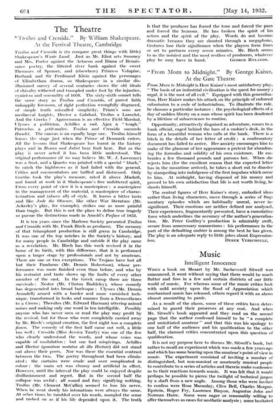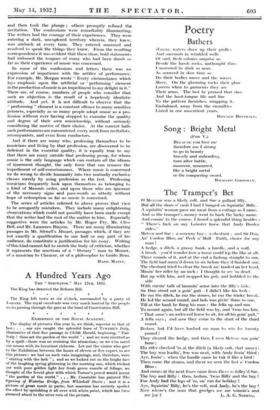Music
Intelligent Innocence
WHEN a book on Mozart by Mr. Sacheverell Sitwell was announced, it went without saying that there would be much flutter and fuss in a few and certain districts of our little world of music. For whereas some of the music critics look with mild anxiety upon the flood of Appreciation which mechanized music has released, others regard it-with an alarm almost amounting to panic.
As a result of the alarm, some of these critics have deter- mined to guard their preserves at any cost. And when Mr. Sitwell's- book appeared and they read on the second page that the author confessed himself to be a complete and uninitiated amateur" and that this was his apology to one half of the audience and his qualification to the other half, the alarmed critics concentrated upon this question of • qualification.
Ills not my purpose here to discuss Mr. Sitwell's book, but rather to recall an experiment which was made a few years ago and which has some bearing upon the amateur's point of view in music. The experiment consisted of inviting a number of distinguished, but non-musical or amateurly musical people to contribute to a series of articles and therein make confession as to their reactions towards music. It was felt that it would perhaps be possible to pierce the twilight of technical jargon by a shaft from a new angle. Among those who were Invited to confess were Rose Macaulay, Clive Bell, Charles Morgan, Epstein,. Roger Fry, Laurence Binyon, Augustus John and Norman Haire. Some were eager or reasonably. willing -to offer themselves as cases for aesthetic analysis ; some hesitated and then took the plunge ; others promptly refused the invitation. The confessions were remarkably illuminating. The writers had the courage of their experiences. They were entering a dark, unexplored territory wherein, they knew. was ambush at every turn. They entered unarmed and resolved to speak the things they knew. From the resulting correspondence it was evident that these clear, bold statements had unloosed the tongues of many who had been dumb so far as their experience of music was concerned.
In some of the confessions and letters there was an expression of impatience with the artifice of performance. For example, Mr. Morgan wrote "Every circumstance which lays emphasis upon the artificial or ' performing ' element in the production of music is an impediment to my delight in it." There are, of course, numbers of people who consider that such an objection is the result of a hopelessly idealistic attitude. And yet, it is not difficult to observe that the - performing " element is a constant offence to many sensitive listeners, especially as so many people adopt music as a pro- fession without ever having stopped to examine the quality and degree of their own musicianship, without seriously considering the motive of their choice. At the concert halls such performances are encountered every week-from recitalists, accompanists, and even from conductors.
And if there are many who, professing themselves to be musicians and living by that profession, are discovered to be deficient in the essential quality, it is equally true to say that there are many outside that professing group, for whom music is the only language which can contain all the idioms of innermost thought, the only force that can remove the impediment of self-consciousness. Where music is concerned we do wrong to divide humanity into two mutually exclusive classes merely by using profession as the test. Professing musicians frequently look upon themselves as belonging to a kind of Masonic order, and upon those who are ignorant of the necessary signs -and pass-words as utterly without hope of redemption so far as music is concerned.
The series of articles referred to above proves that view to be arrogantly mistaken. They include many enlightening observations which could not possibly have been made except that the writer had the root of the matter in WM. Especially suggestive were the articles by Mr. Roger Fry, Mr. Clive Belt-and Mr. Laurence Binyon. There are many illuminating passages in Mr. Sitwell's Mozart, passages which, if they are not exactly a qualification to one half or any part of his audience, do constitute a justification for his essay. Writing of this kind cannot fail to enrich the body of criticism, whether it represents the reactions of a "literary" man to Mozart, of is musician to Chaucer, or of a philosopher to Guido Beni.
BASIL MAINE.





































 Previous page
Previous page